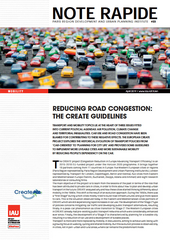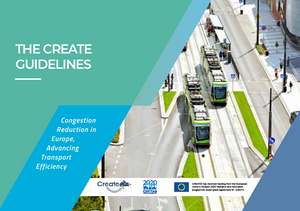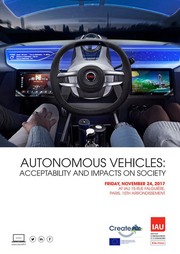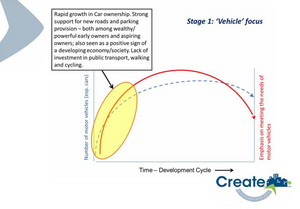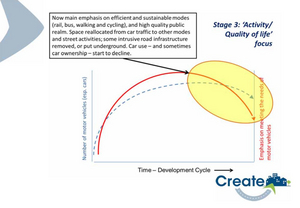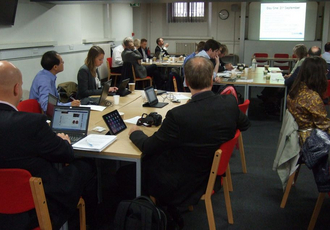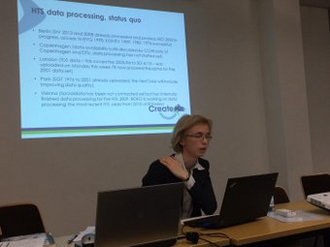The CREATE project
This Note rapide Mobility #23 draws on the The CREATE Guidelines which show how cities can benefit from incorporating these recommandations to local context and norms to spur more sustainable mobility and help people reduce their dependency on the car use.
THE CREATE GUIDELINES
The CREATE Guidelines was undertaken by CREATE partners, European Integrated Projects (EIP) and Vectos. The Guidelines have material synthesised from all of the CREATE cities and the extensive research and exploitation work performed by other project partners.
The Guidelines are the final product of a joint collaboration between 10 core cities, from which other cities can greatly benefit.
The Guidelines provide clear advice to cities as to how they can learn from and adapt the experiences of the transport evolution in other cities to advance their ambitions for sustainable mobility and greater city liveability. The Guidelines focus on:
- Understanding change – what factors and processes explain the transport evolution in the cities over the last half-century.
- Planning for change – How can a city use the understanding of past transport evolution to look forward using new planning methods focusing on city evolution, city visions, scenario development, ‘link and place’ planning and a new regime for scheme appraisal.
- Making change happen – How a city can use the lessons from the cities to plan forward strategies.
AUTONOMOUS VEHICLES
Acceptability and impacts on society
L'Institut Paris Region hosted a seminar on Friday, November 24th, 2017 on autonomous vehicles. Autonomous vehicles are held to be the next shift in the automotive and mobility fields. By affecting the way we approach mobility, these vehicles are likely to have a broad spectrum of impacts on our society. For example, they are likely to reduce pollution and accidents on road and to redesign our urban landscapes by introducing new urban practices.
Still, many questions and hurdles pave the way to autonomous driving. They are technological challenges, but also regulatory, ethical, socio-economic and societal questions in the short and long terms, which need to be addressed in order to have a better understanding of that rising and global thematic.
The purpose of this seminar, held in the context of the European project H2020 CREATE, was to gather experts from different fields approaching these questions and challenges from different angles to fuel the debate.
A visit from our workshadow partner (the city of Skopje)
IAU hosted a delegation from Skopje during two days (March 17-18) in the framework of a work shadowing visit at its headquarters. The exchanges mainly focused on how Paris and its region are tackling traffic congestion and moving towards a more sustainable mobility system. Our Skopje city partners expectations addressed Paris Region traffic and mobility planning, public transport organization and priority systems, travel and traffic information system, bicycle traffic planning and design and bicycle parking and share system, urban logistics and goods distribution, and eventually data collection and monitoring of Measures of effectiveness (MoE).
IAU experts made presentations on the institutional framework of Paris Region transport system and planning context, on the mobility and traffic data collection and applications, and specifically on the concept of mini roundabouts as a tool to improve road traffic efficiency and safety.
STIF (Ile-de-France’s Public Transport Organizing Authority) representative gave presentation of the Ile-de-France Mobility Plan (PDUIF), whereas the RATP Group representative targeted more specifically on trams and buses priority systems. The City of Paris was also invited to present urban logistics and goods distribution, the cycling planning policy and the Velib’ bike sharing system. The program included guided tours: a visit of the Bourdonnais Port (a best practice example of urban logistics in Paris), then a ride by Velib from our headquarters to an exhibition holding at the Pavillon de l’Arsenal, and a technical visit to the Parcival road traffic management center of the Val de Marne department located in Rungis.
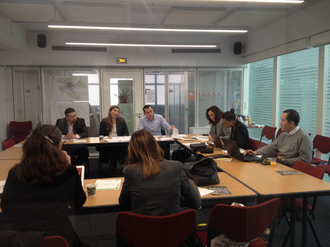
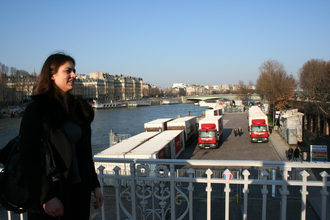
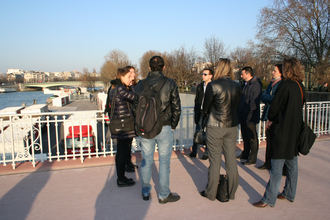
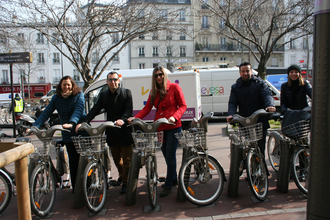
What is CREATE about?
CREATE is a 36 months research project (2015-2018) funded by the European Commission under Horizon2020. It addresses the challenging problems of dealing with car use faced by most cities in Europe and beyond. CREATE’s main objective is to reduce road congestion in European cities, by encouraging a switch from cars to more sustainable transport modes.
The project will explore historical patterns of urban road traffic and car use, identify success factors in encouraging modal shift and lessons learnt in Western European capital cities, and work with Eastern Europe and Euro-med city partners to assist them in developing sustainable strategies. It will also identify ways to deal with the consequences of future population growth and associated mobility densification, through new technologies, business models and social practices.
Most cities around the world are at different stages of an evolutionary transport policy development process. The project promotes knowledge transfer to stage 1 cities and supports them in short-circuiting this evolutionary process, to become more liveable and sustainable. Additionally, stage 3 cities will exchange among themselves and work together on future solutions to move towards a stage 4. The CREATE project will provide stakeholders with concrete tools which can be used by mobility practitioners:
- Guidelines;
- Developing effective and acceptable policies;
- Peer-to-peer exchange;
- Exploitation plans.
CREATE consortium gathers 18 partners including five Eastern European and Euro-Med cities currently in Stage 1 and five Western European cities in Stage 3 working with a wider network of EUROCITIES’ members:
- University College London (UCL), UK
- BOKU, Vienna, Institute for Transport Studies, Austria
- EIP Bucharest (SME), Romania
- EUROCITIES ASBL, Belgium
- Fondation Nationale des Sciences Politiques (FNSP), France
- IAU île-de-France
- INRIX UK Ltd (SME), UK
- COWI, Denmark
- Vectos UK (SME), UK
- City of Berlin, Germany
- City of Copenhagen (CPH), Denmark
- Transport for London (TFL), UK
- Adana Metropolitan Municipality (AMM), Turkey
- Greater Amman Municipality (GAM), Jordany
- City of Bucharest (PMB), Romania
- City of Skopje, Macedonia
- City of Tallinn (TLN), Estonia
- Technishe Universitaet Dresden, Germany
This page is linked to the following category :
Mobility
